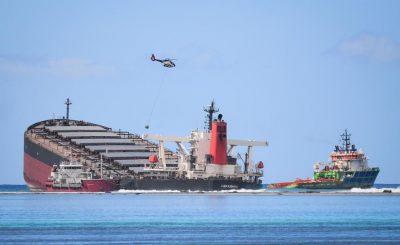Mauritius, a popular holiday destination in the Indian Ocean, known for its beautiful beaches, is currently facing a severe environmental crisis. On the 25th of July, the MV Wakashio bulk carrier, transporting around 4,000 tonnes of oil and diesel, ran aground on the Pointe D’Esny coral reef in the South-East of the island. The ship, owned by Nagashiki Shipping Co., a Japanese company, but registered in Panama, was navigating from China to Brazil when the incident occurred. It was confirmed that the incident resulted from poor navigation and negligence from the crew, who had received several warnings from Mauritian coastguards.
Despite Mauritian authorities repeatedly maintaining that things were under control, the ship started leaking 1,000 tons of oil into the lagoon on the August 6. In opposition to the initial inaction from the government, the Mauritian population quickly mobilised and started making booms to contain the oil. Initially, they were filled with bagasse, a residue from sugar-cane processing. This was not sufficient, and Mauritians responded by collecting and donating human and animal hair, which are known to be great oil absorbents.
On August 7, France sent a navy ship, a military aircraft containing pollution control equipment, and experts from its neighbouring island, La Reunion. Japan sent a team of six advisers for assistance as well. Thankfully, to this day, most of the oil was successfully pumped out, with a small portion still needing to be extracted.
Even so, the spill already had devastating effects on the lagoon, coral reef, and shore of the area and more long-term consequences will follow. Schools in the region even had to shut down because the air was so toxic. The oil spill, already a catastrophe by itself, is even more threatening due to its location. It occurred close to the Blue Bay Marine Park, a UNESCO protected site which is home to many of Mauritius’ protected and endangered species. The biodiverse fauna and flora living in the lagoon are now facing extinction.
The tourism industry, which is at the center of Mauritius’ economy, was already heavily impacted due to COVID-19 – the borders are closed until further notice since March 2020, and is likely to be hampered further due to this ecological disaster.
Please help raise awareness surrounding this issue and consider helping local NGOs as they preserve our unique wildlife and ecosystem!
Nora is currently living in London and entering her final year at University College London pursuing a BA in European Social and Political Studies with a concentration in law, international relations, and Italian. She spent this past year studying abroad in Rome, at La Sapienza University.

